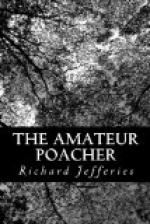Then come the mushrooms: he knows the best places, and soon fills a basket full of ‘buttons’ picking them very early in the morning. These are then put in ‘punnets’ by the greengrocers and retailed at a high price. Later the blackberries ripen and form his third great crop; the quantity he brings in to the town is astonishing, and still there is always a customer. The blackberry harvest lasts for several weeks, as the berries do not all ripen at once, but successively, and is supplemented by elderberries and sloes. The moucher sometimes sleeps on the heaps of disused tan in a tanyard; tanyards are generally on the banks of small rivers. The tan is said to possess the property of preserving those who sleep on it from chills and cold, though they may lie quite exposed to the weather.
There is generally at least one such a man as this about the outskirts of market towns, and he is an ‘original’ best defined by negatives. He is not a tramp, for he never enters the casual wards and never begs—that is, of strangers; though there are certain farmhouses where he calls once now and then and gets a slice of bread and cheese and a pint of ale. He brings to the farmhouse a duck’s egg that has been dropped in the brook by some negligent bird, or carries intelligence of the nest made by some roaming goose in a distant withy-bed. Or once, perhaps, he found a sheep on its back in a narrow furrow, unable to get up and likely to die if not assisted, and by helping the animal to gain its legs earned a title to the owner’s gratitude.
He is not a thief; apples and plums and so on are quite safe, though the turnip-tops are not: there is a subtle casuistry involved here—the distinction between the quasi-wild and the garden product. He is not a poacher in the sense of entering coverts, or even snaring a rabbit. If the pheasants are so numerous and so tame that passing carters have to whip them out of the way of the horses, it is hardly wonderful if one should disappear now and then. Nor is he like the Running Jack that used to accompany the more famous packs of fox-hounds, opening gates, holding horses, and a hundred other little services, and who kept up with the hunt by sheer fleetness of foot.
Yet he is fleet of foot in his way, though never seen to run; he pads along on naked feet like an animal, never straightening the leg, but always keeping the knee a little bent. With a basket of watercress slung at his back by a piece of tar-cord, he travels rapidly in this way; his feet go ‘pad, pad’ on the thick white dust, and he easily overtakes a good walker and keeps up the pace for miles without exertion. The watercress is a great staple, because it lasts for so many months. Seeing the nimble way in which he gathers it, thrusting aside the brook-lime, breaking off the coarser sprays, snipping away pieces of root, sorting and washing, and thinking of the amount of work to be got through before a shilling is earned, one would imagine that the slow, idling life of the labourer, with his regular wages, would be far more enticing.




